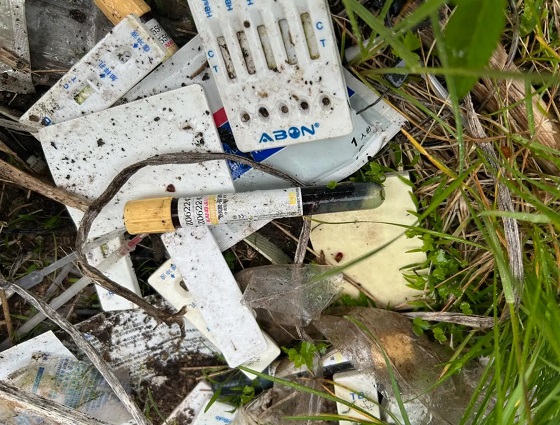Energy
Mark Ruffalo, Hollywood filmmakers wrong about Canadian energy, RBC

Hollywood actors Mark Ruffalo, Rachel McAdams and Joaquin Phoenix are pressuring TIFF to remove RBC as a sponsor because of the bank’s support for Canadian oil and gas. Getty Images photos
From the Canadian Energy Centre
By Deborah JaremkoThey say RBC is not a ‘worthy source of financing’ for Canadian film because of its ongoing support for Canadian oil and gas. They are wrong
A group of Hollywood filmmakers including Mark Ruffalo, Joaquin Phoenix and Rachel McAdams is calling on the Toronto International Film Festival (TIFF) to drop RBC as its main sponsor.
They say RBC is not a “worthy source of financing” for Canadian film because of its ongoing support for Canadian oil and gas. They claim RBC is fueling climate change and disrespecting Indigenous rights.
They are wrong.
RBC is helping fund climate solutions while enabling Indigenous self-determination and prosperity. And Indigenous communities do not want Hollywood to speak for them.
Here are the facts.
Fact: RBC primarily funds Canadian oil and gas, and the world needs more Canadian oil and gas – not less
The world’s growing population needs access to reliable, affordable, responsibly produced energy. And a lot more of it.
According to the United Nations, last November the global population reached 8 billion people, just over a decade after hitting the landmark 7 billion in 2011. Driven by India and China, the world’s population is projected to reach 8.5 billion in 2030 and 9.7 billion 2050.
All those people need energy. Many don’t even have it today, with about 775 million without access to electricity last year, according to the International Energy Agency (IEA).
Even with accelerating investment in low carbon energy resources, the world’s consumption of oil, gas and coal is as high or higher than it has ever been, with both oil and coal demand reaching new records this year, the IEA reports.
The agency projects the world’s total energy consumption – which increased by 15 per cent over the last decade – will increase by a further 24 per cent by 2050.
On the world’s current trajectory, the IEA says oil, gas and coal will account for 62 per cent of world energy supply in 2050, compared to 78 per cent in 2021.
As IEA executive director Fatih Birol said last year, “We will still need oil and gas for years to come… I prefer that oil is produced by countries like Canada who want to reduce the emissions of oil and gas.”
Canada has been a cornerstone of global energy markets and a reliable partner for years, he said.
Fact: Coastal GasLink will help reduce emissions
The Hollywood activists take issue with RBC’s funding of the Coastal GasLink pipeline. This is nonsensical because the project can help reduce emissions in Asia. It also has the support of and is benefiting Indigenous communities.
One of the fastest and most effective ways to reduce emissions is to switch from coal-fired power to power generated from natural gas, traded globally as LNG.
Consider that between 2005 and 2019, emissions from the U.S power sector dropped by 32 per cent because of coal-to-gas switching, according to the U.S. Energy Information Administration.
The LNG Canada project – supplied with Canadian natural gas via Coastal GasLink – will have among the world’s lowest emissions intensity, at 0.15 per cent CO2 per tonne compared to the global average of 0.35 per cent CO2 per tonne, according to Oxford Energy Institute.
Natural gas from LNG Canada alone could reduce emissions in Asia by up to 90 million tonnes annually, or the equivalent of shutting down up to 60 Asian coal plants, the project says. That’s also a reduction of more than the entire emissions of the province of British Columbia, which were 64 million tonnes in 2022.
Expanding Canada’s LNG exports to Asia could reduce emissions by 188 million tonnes per year, or the annual equivalent of taking all internal combustion engine vehicles off Canadian roads, according to a 2022 study by Wood Mackenzie.
“It is a disservice to take the choice of Canadian LNG away from those that need it,” Billy Morin, former chief of the Enoch Cree Nation, said earlier this year.
Fact: Coastal GasLink benefits Indigenous communities
The Coastal GasLink pipeline is enabling shared prosperity between Indigenous communities and Canada’s energy industry.
Not only will it connect to the LNG Canada terminal on the traditional lands of the Haisla Nation – where the project has been transformational for the community, according to Chief Councillor Crystal Smith – but it will also provide natural gas for the proposed Cedar LNG project, in which the Haisla Nation is 50 per cent owner.
“Cedar is not only important from a Haisla perspective, [but from] a global perspective,” Smith says.
“Our territory is not in a bubble and protected from what is happening in Asia and India with coal burning.”
Sixteen First Nations will become 10 per cent owners of the Coastal GasLink pipeline itself once it is completed.
And so far, LNG Canada and Coastal GasLink together have spent more than $5.7 billion with Indigenous-owned and local businesses.
“When there is foreign interference, especially from high-profile celebrities like Ruffalo, it sets us back. He does not think beyond the pipeline. He does not think beyond the cause of the day,” Indigenous policy analyst Melissa Mbarki wrote following a previous attack on Coastal GasLink by the actor.
“Over the long term, such actions serve to drive away investment and keep Indigenous communities in poverty. We are dealing with so many social issues, including high rates of suicide, incarceration and homelessness. Speaking on our behalf is not the answer if you fail to acknowledge the entire story.”
Fact: Indigenous communities speak with their own voices
Ruffalo is a prominent activist against the Coastal GasLink pipeline, often spreading misinformation about the project’s relationship with Indigenous communities. But they are fighting back.
“Hollywood celebrities from outside of Canada are actively campaigning against the Coastal GasLink project, claiming Indigenous People do not support it. However, 20 elected First Nations governments along the route do support it,” the Indigenous Resource Network said in a statement last year.
“Hollywood celebrities are standing in the way of us being able to make our own decisions. Their main goal is to push their agenda and use us as talking points; ultimately, communities are left to pick up the pieces.
“Although their intentions may be to help Indigenous people in Canada, this can be best done by allowing our people to use their own voices. We are able to decide for ourselves what is best for ourselves and our communities.”
Fact: The film industry has its own emissions to deal with
Rather than campaign against Canadian energy projects that can help reduce emissions and foster prosperity for Indigenous communities, Hollywood film makers could be better served addressing the emissions in their own backyard.
A 2020 study by the British Film Institute analyzing the emissions associated with producing movies in the U.S. and U.K. found that films with a budget of $70 million or over generate an average 2,840 tonnes of CO2 pollution.
Air travel alone to support a movie production of this scale generates equivalent emissions of flying one way from London to New York 150 times, BFI said.
Alberta
Upgrades at Port of Churchill spark ambitions for nation-building Arctic exports

In August 2024, a shipment of zinc concentrate departed from the Port of Churchill — marking the port’s first export of critical minerals in over two decades. Photo courtesy Arctic Gateway Group
From the Canadian Energy Centre
By Will Gibson
‘Churchill presents huge opportunities when it comes to mining, agriculture and energy’
When flooding in northern Manitoba washed out the rail line connecting the Town of Churchill to the rest of the country in May 2017, it cast serious questions about the future of the community of 900 people on the shores of Hudson Bay.
Eight years later, the provincial and federal governments have invested in Churchill as a crucial nation-building corridor opportunity to get resources from the Prairies to markets in Europe, Africa and South America.
Direct links to ocean and rail

Aerial view of the Hudson Bay Railway that connects to the Port of Churchill. Photo courtesy Arctic Gateway Group
The Port of Churchill is unique in North America.
Built in the 1920s for summer shipments of grain, it’s the continent’s only deepwater seaport with direct access to the Arctic Ocean and a direct link to the continental rail network, through the Hudson Bay Railway.
The port has four berths and is capable of handling large vessels. Having spent the past seven years upgrading both the rail line and the port, its owners are ready to expand shipping.
“After investing a lot to improve infrastructure that was neglected for decades, we see the possibilities and opportunities for commodities to come through Churchill whether that is critical minerals, grain, potash or energy,” said Chris Avery, CEO of the Arctic Gateway Group (AGG), a partnership of 29 First Nations and 12 remote northern Manitoba communities that owns the port and rail line.
“We are pleased to be in the conversation for these nation-building projects.”
In May, Canada’s Western premiers called for the Prime Minister’s full support for the development of an economic corridor connecting ports on the northwest coast and Hudson’s Bay, ultimately reaching Grays Bay, Nunavut.
Investments in Port of Churchill upgrades
AGG, which purchased the rail line and port from an American company in 2017, is not alone in the bullish view of Churchill’s future.
In February, Manitoba Premier Wab Kinew announced an investment of $36.4 million over two years in infrastructure projects at the port aimed at growing international trade.
“Churchill presents huge opportunities when it comes to mining, agriculture and energy,” Kinew said in a release.
“These new investments will build up Manitoba’s economic strength and open our province to new trading opportunities.”
In March, the federal government committed $175 million over five years to the project including $125 million to support the rail line and $50 million to develop the port.
“It’s important to point out that investing in Churchill was something that both the Liberal and Conservative parties agreed on during the federal election campaign,” said Avery, a British Columbian who worked in the airline industry for more than two decades before joining AGG.
Reduced travel time
The federal financial support helped AGG upgrade the rail line, repairing the 20 different locations where it was washed out by flooding in 2017.
Improvements included laying more than 1,600 rail cars worth of ballast rock for stabilization and drainage, installing almost 120,000 new railway ties and undertaking major bridge crossing rehabilitations and switch upgrades.
The result has seen travel time by rail reduced by three hours — or about 10 per cent — between The Pas and Churchill.
AGG also built a dedicated storage facility for critical minerals and other commodities at the port, the first new building in several decades.
Those improvements led to a milestone in August 2024, when a shipment of zinc concentrate was shipped from the port to Belgium. It was the first critical minerals shipment from Churchill in more than two decades.
The zinc concentrate was mined at Snow Lake, Manitoba, loaded on rail cars at The Pas and moved to Churchill. It’s a scenario Avery hopes to see repeated with other commodities from the Prairies.
Addressing Arctic challenges
The emergence of new technologies has helped AGG work around the challenges of melting permafrost under the rail line and ice in Hudson Bay, he said.
Real-time ground-penetrating radar and LiDAR data from sensors attached to locomotives can identify potential problems, while regular drone flights scan the track, artificial intelligence mines the data for issues, and GPS provides exact locations for maintenance.
The group has worked with permafrost researchers from the University of Calgary, Université Laval and Royal Military College to better manage the challenge. “Some of these technologies, such as artificial intelligence and LiDAR, weren’t readily available five years ago, let alone two decades,” Avery said.
On the open water, AGG is working with researchers from the University of Manitoba to study sea ice and the change in sea lanes.
“Icebreakers would be a game-changer for our shipping operations and would allow year-round shipping in the short-term,” he said.
“Without icebreakers, the shipping season is currently about four and a half months of the year, from April to early November, but that is going to continue to increase in the coming decades.”
Interest from potential shippers, including energy producers, has grown since last year’s election in the United States, Avery said.
“We’re going to continue to work closely with all levels of government to get Canada’s products to markets around the world. That’s building our nation. That’s why we are excited for the future.”
Alberta
OPEC+ is playing a dangerous game with oil

This article supplied by Troy Media.
OPEC+ is cranking up oil supply into a weak market. It’s tried this strategy before, and it backfired
OPEC+ is once again charging headfirst into a market share war—a strategy that has repeatedly ended in disaster. Despite weak global demand, falling prices and rising output from non-OPEC countries, the cartel has chosen to flood the market. History shows this tactic rarely ends well for
OPEC+ or oil producers worldwide, including Canada.
OPEC+, a group of major oil-exporting countries led by Saudi Arabia and Russia, works together to manage global oil supply and influence prices. Its decisions have far-reaching consequences for the global energy market—including for Canadian oil producers.
Last Saturday, eight leading members of OPEC+ announced, after a virtual meeting, that they would increase production by 548,000 barrels per day starting in August. That is significantly more than the group’s recent additions of 411,000 bpd, and it puts them on track to fully unwind their
previous 2.2 million bpd in cuts a full year ahead of schedule.
It is a bold move, but it comes at a questionable time.
There is little geopolitical premium built into current oil prices, and the global market is already oversupplied. Brent crude futures are down more than six per cent so far this year. Analysts estimate inventories have been climbing by a million barrels per day in 2025 due in part to cooling demand in China and rising output from countries outside OPEC.
S&P Global Commodity Insights forecasts a supply surplus of 1.25 million barrels per day in the second half of the year. Brent crude stood at about US$68 per barrel on Friday, but S&P says it could fall to between US$50 and $60 later this year and into 2026. West Texas Intermediate, the U.S. benchmark, is also at risk of dropping below US$50 per barrel.
Canada is the world’s fourth-largest oil producer, with most of its output coming from Alberta’s oil sands. Though Canadian producers have higher costs than some OPEC+ members, their innovation and access to U.S. markets have made them increasingly competitive.
While the seasonal demand boost might justify a modest increase, OPEC+, especially Saudi Arabia, appears primarily motivated by market share concerns. With U.S. shale and countries like Canada, Kazakhstan and Guyana gaining ground, the cartel is falling back on its old tactic of flooding the market to squeeze out competitors.
Some observers, including Stanley Reed in The New York Times, have suggested that the move may be designed to please U.S. President Donald Trump, who “has made courting Saudi Arabia and regional allies like the United Arab Emirates a priority of his foreign policy.” But even geopolitical gamesmanship has not shielded OPEC+ from the consequences before—and likely will not this time either.
Back in 2014, fed up with the U.S. shale boom, OPEC opened the taps. The goal was to drive prices low enough to force out higher-cost producers. Instead, oil plunged into the US$30 range. According to the World Bank, the 70 per cent drop during that period was one of the three biggest oil crashes since the Second World War and the most prolonged since the supply-driven collapse of 1986. Saudi Arabia’s respected oil minister, Ali Al-Naimi, lost his job in the aftermath.
Then, in April 2020, as the COVID-19 pandemic loomed, OPEC and Russia launched a production war that sent oil prices into freefall, briefly into negative territory. Trump had to broker a ceasefire to rescue the U.S. shale industry, forcing Riyadh and Moscow to pull back. Both sides suffered significant economic damage.
For Canada, especially Alberta, the current fallout could be severe. The province is home to most of the country’s oil sands production. Cheaper global crude undercuts Canadian prices, squeezes royalty revenues, chills investment and puts jobs at risk across Canada. And this comes as governments are already grappling with fiscal pressures.
The oil market does not reward short-term thinking. If OPEC+ continues down this road, history suggests the outcome will be painful for them and the rest of us.
Toronto-based Rashid Husain Syed is a highly regarded analyst specializing in energy and politics, particularly in the Middle East. In addition to his contributions to local and international newspapers, Rashid frequently lends his expertise as a speaker at global conferences. Organizations such as the Department of Energy in Washington and the International Energy Agency in Paris have sought his insights on global energy matters.
Troy Media empowers Canadian community news outlets by providing independent, insightful analysis and commentary. Our mission is to support local media in helping Canadians stay informed and engaged by delivering reliable content that strengthens community connections and deepens understanding across the country
-

 Energy2 days ago
Energy2 days agoIs The Carney Government Making Canadian Energy More “Investible”?
-

 Business2 days ago
Business2 days agoCompetition Bureau is right—Canada should open up competition in the air
-

 Immigration2 days ago
Immigration2 days agoUnregulated medical procedures? Price Edward Islanders Want Answers After Finding Biomedical Waste From PRC-Linked Monasteries
-

 Business2 days ago
Business2 days agoDemocracy Watchdog Says PM Carney’s “Ethics Screen” Actually “Hides His Participation” In Conflicted Investments
-

 Business2 days ago
Business2 days agoIt’s Time To End Canada’s Protectionist Supply Management Regime
-

 COVID-192 days ago
COVID-192 days agoFreedom Convoy leaders’ sentencing hearing to begin July 23 with verdict due in August
-

 National2 days ago
National2 days agoLiberals push to lower voting age to 16 in federal elections
-

 Bruce Dowbiggin23 hours ago
Bruce Dowbiggin23 hours agoHow Did PEI Become A Forward Branch Plant For Xi’s China?










